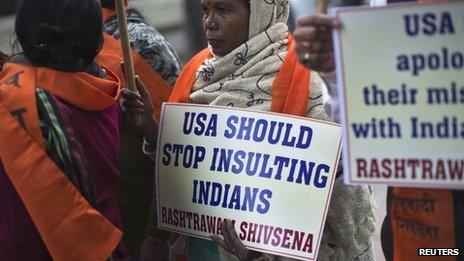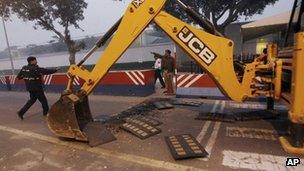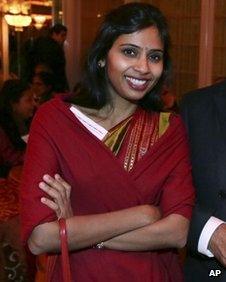Devyani Khobragade: Bureaucratic and diplomatic negligence
- Published

The Indian and US negligence has turned a minor legal case into a diplomatic and political test of the countries' relationship
Every crisis theoretically provides an opportunity. But the current diplomatic rift between the United States and India seems to be a lost opportunity to avoid a crisis.
Rather than deepening relations, the two countries are deep into a lengthy period of crisis management.
The brouhaha was triggered by the arrest of the Indian deputy consul general in New York, Devyani Khobragade.
Ms Khobragade was accused of lying on an application for her housekeeper's work visa, over-reporting the amount of money the housekeeper was paid.
This is the third case of alleged mistreatment by Indian diplomats in New York in three years.
The US contends that Ms Khobragade's limited diplomatic immunity does not cover private conduct that violates US law.
'Despicable and barbaric'
Political hell has broken loose in India over the manner in which Ms Khobragade was detained. She was handcuffed after dropping off her child at school, subjected to a strip and body cavity search, then placed in a cell with the general jail population.

Barricades were removed from the front of the US embassy in Delhi, apparently in retaliation
A high-level Indian official characterised the treatment as "despicable and barbaric". Secretary of State John Kerry called Indian National Security Adviser Shivshankar Menon to express regret.
New Delhi has retaliated by taking away privileges accorded US diplomats in India and removing security barriers guarding the American embassy there.
It has also elevated Ms Khobragade to a position at its United Nations mission that carries full diplomatic immunity. Whatever this means for the court case, it clearly indicates the dispute is no longer just a diplomatic problem but a political one as well.
The strip-search was an unforced error.
The US Marshals Service says it followed "standard arrestee intake procedures," a cringe-worthy bureaucratic phrase that means it went by the book.
Ms Khobragade was treated like every other female defendant awaiting a court appearance.
But the arrest of a diplomat is never just another case. If the state department did not know she would be strip-searched, it should have - and should have demanded special handling.
In diplomatic circles, any perceived slight is reciprocated. You step on our toes, expect the same. The political and public fallout was predictable, particularly in a country like India with a vigorous and sometimes inventive media.
En route to the courtroom in lower Manhattan, both countries lost sight of the big picture and the broader interests that should shape the relationship between the world's oldest and largest democracies.
Other options
India is a rising power the United States has been cultivating for years.
Frustration over the consulate's dismal human rights record is understandable, but a prosecution is necessarily a lengthy process that is bound to cast a shadow over the relationship even under the best of circumstances. The Italian case of American Amanda Knox comes to mind.
The state department alerted India about the case in September, but it's unclear what diplomatic efforts were undertaken to resolve the underlying issues short of prosecution.
The US could have declared Ms Khobragade persona non grata, demanded her immediate departure and refused further work visas for domestic help for Indian diplomats.
But once the United States chose to prosecute, it had not just to do everything by the book but do everything right, to keep the case focused on her. That obviously did not happen.

Devyani Khobragade at a fundraiser on 8 December
On the Indian side, it is unclear why the Indian ambassador to the United States or the country's foreign ministry failed to clean house when first alerted by US authorities.
Indian diplomats surely understand that disrespecting US law and international norms undermine its emergence as a constructive global actor.
India's removal of security barriers is excessive and irresponsible.
Even if the remaining security arrangements are adequate - India has primary responsibility for embassy security under the Vienna Convention - New Delhi should understand how sensitive such a move is given last year's attack on a US diplomatic post in Benghazi, Libya.
Once charges were pending, both sides should have worked together to ensure the case did not undermine vastly improved, but still occasionally testy, relations between the two countries. That didn't happen either.
That India and the United States have allowed a minor legal case to become a major test in US-India relations is bureaucratic and public diplomacy negligence.
After all, tending to the big picture is supposedly what governments and foreign ministries do for a living.
There are still plenty of reasons to be optimistic about US-India relations. Mutual interests far outweigh differences. But if this week is any indication, the road ahead will be bumpy.
PJ Crowley is a former Assistant Secretary of State and now a professor of practice and fellow at The George Washington University's Institute of Public Diplomacy and Global Communication.
- Published19 December 2013
- Published17 December 2013
- Published13 December 2013